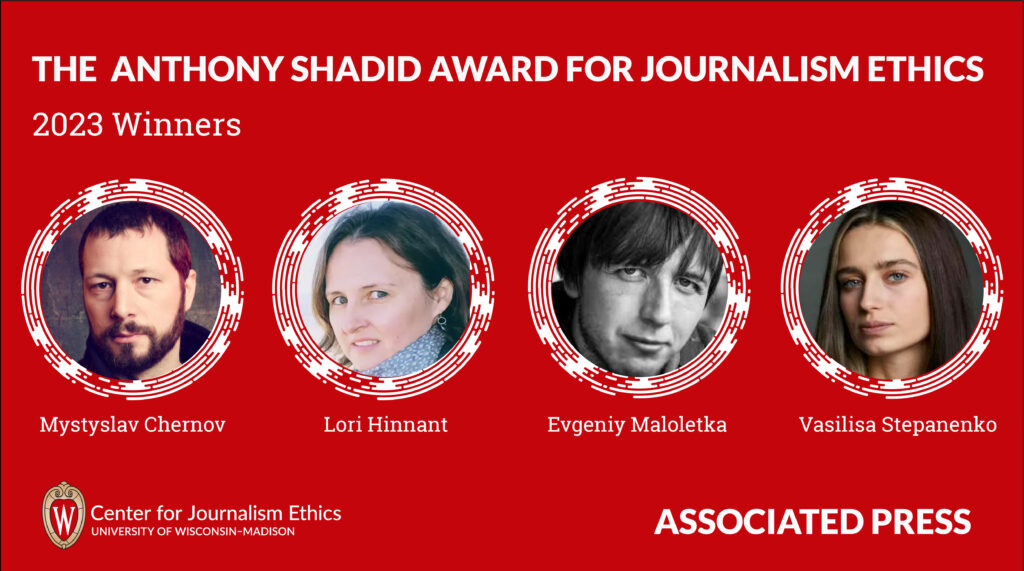
Associated Press reporting on Russian attack on Mariupol wins 2023 Anthony Shadid Award for Journalism Ethics
A team of Associated Press reporters has won the 2023 Anthony Shadid Award for Journalism Ethics for their work documenting the Russian attack on the Ukrainian city of Mariupol in March of 2022.
For almost three weeks, video journalist Mystyslav Chernov, photographer Evgeniy Maloletka and video producer Vasilisa Stepanenko were the last international journalists on the ground documenting the atrocities committed as Russian forces closed in on Mariupol. With AP journalist Lori Hinnant, the team brought the shocking new realities of the war in Ukraine to an international audience and put pressure on Russia to open humanitarian corridors.
The Center for Journalism Ethics presented the award on May 17 in a ceremony at the University Club in New York City.
The event also featured a moderated conversation on journalism ethics with investigative reporter and senior writer at ESPN, Steve Fainaru and award-winning journalist and author David Maraniss.
Named for UW–Madison alum and Pulitzer Prize-winning reporter Anthony Shadid, the award honors the difficult ethical decisions journalists make when telling high-impact stories. Shadid, who died in 2012 while on assignment covering Syria, was a member of the Center for Journalism Ethics advisory board and worked to encourage integrity in reporting.
The Shadid Award judging committee lauded the extraordinary care, quick thinking and courage the Associated Press team demonstrated while covering the earliest stages of the war.
Lucas Graves, associate professor in the UW-Madison School of Journalism and Mass Communication and chair of the committee, said this year’s winner edged out a strong pool of finalists.
“Reporting from Mariupol weeks into the Russian siege, the AP team faced a string of difficult choices,” Graves said. “Like previous generations of journalists on the front lines, they had to weigh their duties as reporters and as human beings. This meant not just protecting sources but helping victims of the war — and accepting their help to avoid capture and get the story out.”
Graves also praised the other finalists for the award:
2023 Finalists
|
“Anthony Shadid’s legacy indeed burns bright reading the work of this year’s winners,” said Kathleen Bartzen Culver, director of the Center for Journalism Ethics. “The courage and integrity they showed is surpassed only by the humanity they brought in sharing this vital reporting with all the rest of us.”
Fainaru is an investigative reporter at ESPN and co-author of the award-winning, New York Times best seller “League of Denial: The NFL, Concussions and the Battle for Truth.” He won the 2008 Pulitzer Prize for International Reporting for his coverage of the Iraq war and was a friend and colleague to Shadid. Conversation moderator David Maraniss is a New York Times bestselling author and associate editor at the Post. He is a three-time Pulitzer Prize finalist and won a Pulitzer for National Reporting in 1992.
ABOUT ANTHONY SHADID: The award is named for Anthony Shadid, a UW-Madison journalism alumnus and foreign reporter for the Washington Post and The New York Times. Shadid won two Pulitzer Prizes for his courageous and informed journalism. He died in February 2012 while reporting in Syria.
Shadid had a special connection to the University of Wisconsin-Madison, its School of Journalism and Mass Communication and the Center for Journalism Ethics. He sat on the Center’s advisory board and was a strong supporter of its aim to promote public interest journalism and to stimulate discussion about journalism ethics.
ABOUT THE CENTER: The mission of the Center for Journalism Ethics is to encourage the highest standards in journalism ethics worldwide. We foster vigorous debate about ethical practices in journalism and provide a resource for producers, consumers and students of journalism. We honor the best in ethical journalistic practice and will not hesitate to call attention to journalistic failings. The Center is housed in the School of Journalism and Mass Communication at the University of Wisconsin-Madison.
